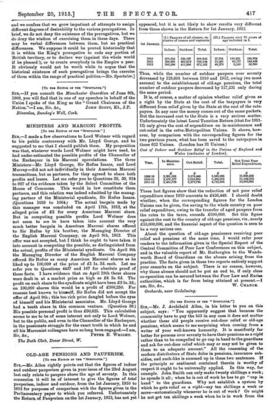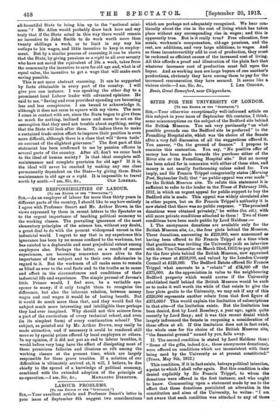(To THE EDITOR OP Tas " SPECTATOR.") Sts,—Mr. J. Archibald
Allen, in his letter to you on this subject, says: " You apparently suggest that because the community have to pay the bill in any case it does not matter whether these old people receive out-door relief or old-age pensions, which seems to me surprising when coming from a writer of your well-known humanity. It is manifestly far better for persons over seventy to have their pensions as a right rather than to be compelled to go cap in hand to the guardians and ask for out-door relief which may or may not be given to them to an adequate amount." All the reasoning of the modern distributors of State doles in pensions, insurance sub- sidies, and such-like is summed up in these two sentences. If the principle or sentiment contained therein is worthy of respect it ought to be universally applied. In this way, for example. John Smith can only make twenty shillings a week; he spends it all ; when he is out of work he has to go " cap in hand" to the guardians. Why not establish a system by which he gets relief as a right—say ten shillings a week or more—automatically whenever he is out of work ? Or might he not get ten shillings a week when he is in work from the all-bountiful State to bring him up to the "national mini- mum " P Mr. Allen would probably draw back here and say truly that if the State acted in this way there would remain no incentive to John Smith to do work worth more than twenty shillings a week, or to limit in any way his outlays to his wages, and little incentive to keep in employ- ment. But by a similar process of reasoning it can be shown that the State, by giving pensions as a right to all over seventy who have not saved the equivalent of 108. a week, takes from the community the incentive to save for old age and, what is of equal value, the incentive to get a wage that will make such saving possible. This is not mere abstract reasoning. It can be supported by facts obtainable in every part of the country. I will give you one instance. I was speaking the other day to a prominent local Labour leader with advanced opinions. He said to me, " Saving and even provident spending are becoming less and less conspicuous. I am bound to acknowledge it, although it does not seem to square with my views. The men I come in contact with are, since the State began to give them so much for nothing, inclined more and more to act on the assumption that they need not trouble about anything, seeing that the State will look after them. To induce them to make a sustained trade-union effort to improve their• position is even more difficult, although there is a class that will ' down tools' on account of the slightest grievance." The first part of this statement has been confirmed to me by pension officers in several parts of the country. After all, don't we come back to the ideal of human society P Is that ideal complete self- maintenance and complete provision for• old age P If it is, the ideal will never be reached by making any one class permanently dependent on the State—by giving them State maintenance in old age as a right. It is impossible to travel
north by south.—I am, Sir, &c., OLD LIBERAL.











































 Previous page
Previous page